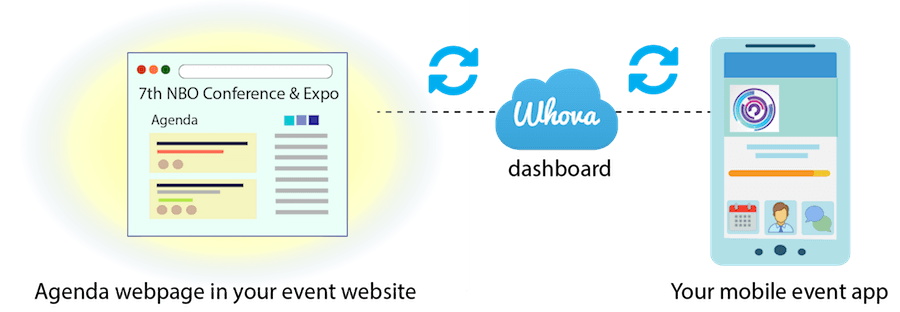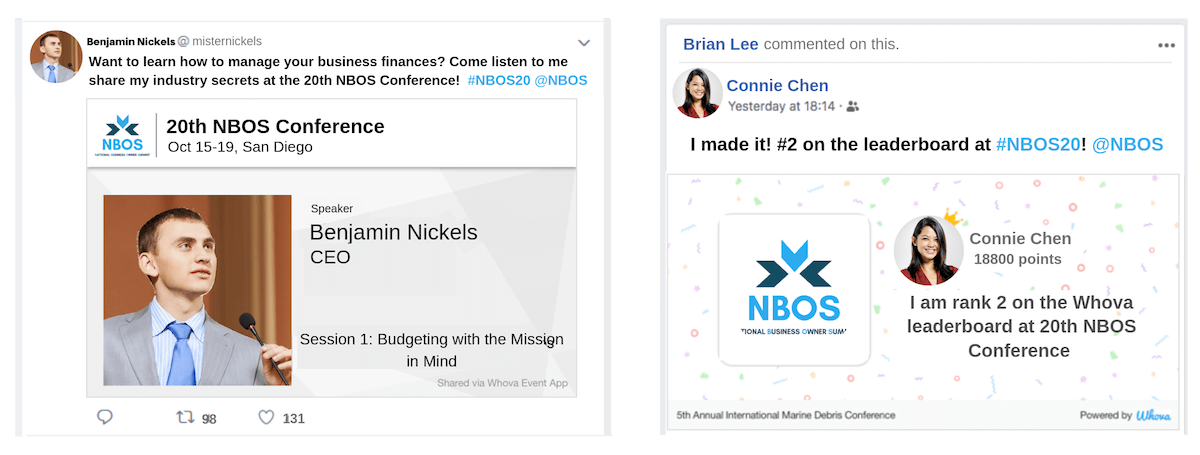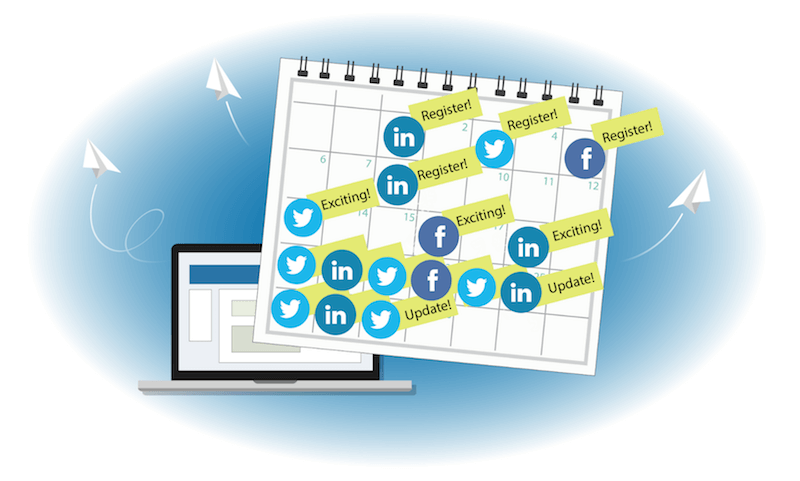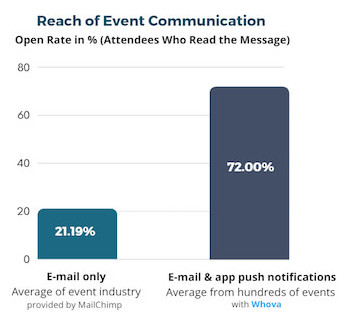How to Create an Actionable Event Marketing Plan in 2024
You put a great amount of effort into organizing an event, but that doesn't mean you don't still get worried. How can you encourage people to show up? And how you can make sure your attendees get the most out of your event once they arrive?
This is where event promotion comes in.
While there's a lot involved in event promotion, you don't need to be overwhelmed! We know it's hard to come up with promotion ideas. Here, we provide a straightforward guide to compiling your marketing strategies and making good use of recent technology. This will help you increase event attendance and attendee satisfaction while saving your own time and effort.
What Is an Event Marketing Plan & Why Is It Important?
An event marketing plan is a strategic roadmap that outlines the promotional activities and tactics an organization will use to attract attendees, sponsors, and exhibitors to an event. It encompasses a range of activities designed to create awareness, generate interest, and drive engagement before, during, and after the event.
By considering the objectives and goals, target audience, unique value proposition, and marketing channels, an effective event marketing plan will help your event reach true success.
Consider these 4 Ps as basic principles to guide you through your process:
- Plan: Have a comprehensive marketing plan with strategies and guidelines that you will use to promote your event in different channels in order to reach your goals.
- Place: With the event location set, you'll be able to generate buzz and engage potential attendees with location specific event details.
- Platform: Think of the different mediums, such as social media platforms, that not only reach your desired target audience but also have the necessary functionalities.
- Price: Based on your marketing budget, you must evaluate and compare the available tools you'll be using that will satisfy both price and quality.
Note: If you don't want to miss out on any of these crucial points, think about utilizing apps for event planning to save time and money while expanding your event marketing potential.
After collaborating with more than 50,000 event organizers, we developed the following 8-step guide to create an effective marketing plan for an event.
8 Key Steps to Create a Successful Event Marketing Plan
- Set the Goals and Budget for Your Event
- Set Event Content Creation and Management Tactics
- Leverage Your Event Speakers and Attendees
- Promote Your Event in the Right Places
- Summarize Your Communication Tactics
- Develop Personalization Tactics
- Establish Last-minute Promotion and Engagement Tactics
- Set Your Performance Evaluation Metrics
Step 1: Develop Your Event Budget and Set Goals
Your event's goals are what your event marketing plan is based on, so you must set them before moving onto the next steps.
Ask yourself, do you want your event to achieve a tangible goal such as attracting 700 attendees? Or are you aiming for an intangible goal such as strengthening relationships with your association members or business partners through the event? Once you've decided your goal, make sure your team is on the same page and pursuing the same goal.
Big or small, you need to be aware of the budget allocated to your marketing efforts, too. While constraints will set limits on certain things, they'll also show you where you can afford to get creative in your marketing plan.
There are a few things you can think about for your event marketing budget:
- Define and Break Down Your Budget
- Get Quotes from Multiple Sources (including DIY options)
- Prioritize and track Your Expenses
- Review Past Events Budgets/Expenses (If any)
- Be Flexible to Adjust
Overwhelmed by Structuring Your Marketing Plan?
Use Whova's all-in-one event management software to streamline your strategy and ensure nothing falls through the cracks
Step 2: Set Event Content Creation and Management Tactics
With your goals in mind, prepare your marketing content, starting with the event schedule and speaker list. You may also want to highlight key messages, such as the benefits of attending the event, keynote speeches, testimonials or a video from a previous event.
Ensure you have a sound content management plan before you move ahead to the next step and create an event website, event app, and start spreading the word. This will help you avoid a ton of manual tasks and wasted time. Of course, not all your event information will be available right away, which means you may have to manually and repeatedly update event websites, event registration pages, and many other materials such as an event app.
Some recent tools like the Event Website Builder automate time-consuming tasks, reduce human error, and ensure professional-looking results thanks to sleek templates. For example, you can transform complicated spreadsheets into color-coded multitrack agendas that can be easily inserted into your event websites and mobile web pages. Best of all, any updates in your dashboard will automatically sync with your websites as well as the Whova event app.
Speaker webpages are also quicker to design as speakers are empowered to submit their own details through the Speaker Info Collector. You can also collect exhibitor information, including brochures and maps, through an online portal to make your exhibitor webpages.


If you host the same conference every year, or multiple similar events in different locations, you may want to reuse event content like agendas, name badge designs, surveys, sponsor information, and floorplans. Check if your software can help you easily reload and edit past event content.
Step 3: Leverage Your Event Speakers and Attendees
You, your speakers, sponsors, and exhibitors share the same goals: You all want to attract more attendees to the event and increase your brand visibility. Use this common goal as part of your event marketing strategy to motivate these event participants to help promote your event.
Whova seamlessly integrates with social media to inspire your speakers to post on social media and promote their session — and your event — ahead of time. Thanks to ready-made text and striking headshot images, all they have to do is click a button to share. Because many speakers are thought-leaders with large networks, this is a great way to get the word out. You can also ask your exhibitors to spread the word about your event on social media.
Attendees are motivated to promote your event on social media, too. The Leaderboard Contest recognizes the most active members of the Whova Community, encouraging attendees to exchange thousands of messages. They can then share their ranking on social media with a ready-to-post message, generating a marketing buzz before and during your event.

With Whova's Social Media Scheduler, you can conveniently schedule your own social media posts for multiple places in advance. This helps you promote your event on as many different networks as possible without leaving the Whova dashboard.
The Social Media Scheduler doesn't only help you create a buzz on social media — it also shows you the engagement with your posts. This allows you to monitor the success of your event promotion so you can adjust course as needed to attract more attendees.

Step 4: Promote Your Event in the Right Places
To properly identify your target market, you need to define it through attendee demographics such as age, gender, and industry. You should also consider psychographics such as usage of technology, interests, and motivation to attend your events.
One way to do this is to analyze attendee data collected from previous events. Alternatively, once you've run a campaign, you can check your event website traffic to understand your audience as well as the impact of your event promotion.
You don't have to learn Google Analytics — some tools like Whova's agenda webpage builder also show real-time analytics without requiring any technical skills. These analytics gives you rich insights into webpage traffic, including which sessions and speakers seem the most popular, where your web visitors are located, and what devices they're using. This can help you adjust your event marketing plan as needed, better prepare for your event, and understand how it's growing.
Event listing websites such as Eventful, Hey Event, and 10times are also good places to promote your event.
Step 5: Summarize Your Communication Tactics
Marketing an event is all about engaging audiences, so you really have to set your communication tactics straight.
Consider how to effectively inform people about your event. While there are great e-mailing systems like Mailchimp, it can also be effective to combine both email and push notifications via an event app. In fact, you can reach open rates of 70% and up, compared to the event industry average of 20%. With Whova, you can send messages through both channels with one click. (Request more information about the Whova's announcement system)

Step 6: Develop Personalization Tactics
It's important to tailor your messages in a way that attracts people's interests. If your event invitation will go out to previous attendees, you can mention this to engage them and add statistics, videos, or pictures from a previous event. Add the highlights of your upcoming event, like keynote speakers, opportunities to learn and connect with people, and discounts for early-bird tickets.
If you use an event management software, see if it provides useful templates for emails and announcements that are targeted to event audiences. Sending announcements to different groups of attendees is a great way to personalize your event marketing strategy.
Some tools also allow you to increase the visibility of your speakers and exhibitors through your event website and with ad banners, company profiles, and coupons and giveaways on your trade show app. With a personalized event app, you can even create a customized experience and information for different event participants, such as speakers and exhibitors.
Step 7: Establish Last-minute Promotion and Engagement Tactics
In our experience, many successful events have provided a place for their attendees to virtually interact with one another ahead of time. This helps create a buzz and increases word of mouth among attendees.
One example is the Community Board, one of Whova's most-loved features among attendees and organizers. Many events have seen more than 1,500 posts within the Community, where event participants ask organizers questions, plan meet-ups, schedule carpools, create custom discussion topics, share photos of their experience, find lost items, and more.
The Photo and Caption Contests also motivate attendees to engage in your event. All these activities on your event app are showcased in the Activity Stream on your event website, inspiring more people to attend your event.
Request a demo if these features sound interesting to you.
Step 8: Measuring the Success of Your Event Marketing Efforts
After a succesful event, it's important to analyze the post-event results of your event marketing plan in order to find improvements and flaws that can be further tuned for future event planning.
In your event marketing plan, write out what exact quantitative metrics you'll use to evaluate your event's performance. These will measure in numbers the success of your marketing efforts. Here are some key metrics to track:
- Attendance: Attendance rate is a good indicator to show how many people attended based on the effects of your event marketing strategies.
- Engagement: If you used social media platforms, you can monitor different metrics such as likes, shares, and comments to gauge the attendee engagement.
- Return of Investment: You can calculate the profit generated by comparing your event marketing budget used and the revenue generated from the event through methods like ticket sales and sponsorships.
- Marketing Effectivenes: Depending on the marketing strategies, you should keep track of the performance. For example, emails can be measured through open rates, click-through rates, and ad performance.
Once you have the numbers down, you can also look into more qualitative metrics to gather such as post-event surveys. In order to conduct a post-event survey, you'll need to design the survey, choose an appropriate survey tool, distribute the survey, collect the responses and analyze the results. The responses can provide an insight into your marketing efforts that had served to attract and set expectations for attendees.
Finally, create a report to show your team and stakeholders your event's success, as well as for promotion in a newsletter or PR purposes. The data and insights you gain will help you plan and prepare future events even better.
All of this can be easily achieved with an all-in-one event management software that will provide the right tools for you. The Whova app includes a post-event report to ensure that you understand exactly how well your event went.
Start Creating a Tailored Marketing Plan for Your Event
Successful marketing for events relies on carefully laid plans. By taking into consideration your event goals, content management, promotion efforts, engagement activities, and the technology you use, you will be sure to create a great marketing plan for your event. An event marketing software can greatly facilitate your event marketing planning, providing tools to streamline processes and create content.
Learn more about succesfully planning your event through an event planning checklist or check more event marketing tips.
